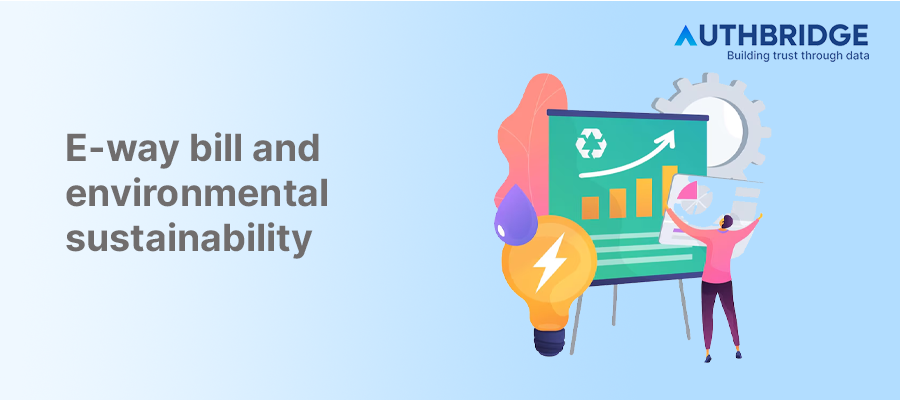E-Way Bill And Environmental Sustainability: Advancing Towards Greener Logistics In India

1. Impact of GST on Environmental Sustainability
GST and Green Taxation
The Goods and Services Tax (GST) in India has been a significant reform for the economy, impacting various sectors, including environmental sustainability. GST has the potential to encourage eco-friendly business practices through green taxation. By levying higher taxes on goods and services that are harmful to the environment and offering incentives for green alternatives, GST can influence manufacturers and consumers to make environmentally conscious choices. This shift not only helps in reducing the carbon footprint but also promotes the use of renewable energy, efficient waste management, and sustainable manufacturing processes.
Encouraging Eco-friendly Business Practices
GST has streamlined the tax structure in India, making it more conducive for businesses to adopt eco-friendly practices. For instance, the input tax credit mechanism under GST allows businesses to claim credits on the tax paid on inputs used in the manufacturing of goods or services. This can include environmentally friendly materials, thereby reducing the overall cost of green products and encouraging businesses to integrate sustainable practices into their operations. Furthermore, the government has also categorized certain eco-friendly products under lower GST rates to make them more affordable for consumers, thus promoting environmental sustainability.
2. Understanding E-Way Bills
Compliance Components
An e-way bill is a digital document required for the transportation of goods worth more than Rs. 50,000, facilitating the seamless movement across states or within a state. The key components ensuring compliance include:
- Generation of E-way Bill: Mandatory for transportation of goods exceeding the specified value, generated by the consignor or the transporter.
- Information Required: Details of the goods, consignor, consignee, and transporter, along with the vehicle number.
- Validity: Based on the distance the goods are transported, with extensions available under specific conditions.
Table: E-Way Bill Validity Period
Distance (km) | Validity Period |
Up to 100 | 1 Day |
101 to 300 | 3 Days |
301 to 500 | 5 Days |
501 and above | 10 Days |
Integration with VAHAN Portal
The integration of the e-way bill system with the VAHAN portal, the national vehicle registry, streamlines the verification process of transport vehicles, ensuring that the vehicle details are accurate and up-to-date, thereby reducing the risk of fraud and enhancing the efficiency of goods transportation.
Validity and Regulations
The validity of an e-way bill is determined by the distance the goods are to be transported, with specific regulations in place for the extension of validity under certain circumstances, such as transit delays.
3. E-Way Bill Integration in Supply Chain Management
Minimized Environmental Impact
The shift to a digital e-way bill system significantly reduces the need for paper-based documentation, contributing to environmental sustainability through reduced paper waste and lower carbon emissions associated with the physical transportation of documents.
Table: Impact of Digitalization on Environmental Sustainability
Aspect | Impact |
Paper Usage | Significant reduction in the consumption of paper. |
Carbon Footprint | Lowered emissions due to decreased physical transportation needs. |
Operational Efficiency | Enhanced through real-time tracking and reduced need for manual checks. |
Improved Efficiency and Transparency
Digital e-way bills enhance the transparency and efficiency of the supply chain by providing real-time visibility into the movement of goods, enabling better route planning and reducing idle times.
Compliance and Regulation Alignment
E-way bill integration ensures compliance with GST regulations, facilitating the smooth movement of goods and adherence to environmental standards.
Informed Decision-Making with Data
The data generated from e-way bills can be analyzed to optimize supply chain operations, predict demand, and make informed decisions that contribute to sustainability.
4. Challenges and Prospects
Technological Barriers
Adopting digital solutions poses challenges, especially for small and medium enterprises (SMEs) lacking the resources to integrate advanced technologies.
Cybersecurity Concerns
The digital nature of e-way bills raises concerns about data security and privacy, necessitating robust cybersecurity measures.
Accessibility and Affordability
Ensuring that the e-way bill system is accessible and affordable for all stakeholders, particularly SMEs, is crucial for widespread adoption.
5. Conclusion: Towards Sustainable Logistics
The integration of e-way bills into supply chain management represents a significant step towards achieving sustainable logistics in India. By minimizing environmental impact, improving efficiency, and ensuring compliance, e-way bills facilitate a more sustainable and efficient supply chain ecosystem.
Table: Prospects for Sustainable Logistics
Factor | Description |
Technological Advancement | Continued innovation in logistics technology will further enhance sustainability. |
Policy Support | Government initiatives to support the adoption of sustainable practices in logistics. |
Stakeholder Engagement | Collaboration among all stakeholders to overcome challenges and leverage opportunities. |
By addressing the challenges and leveraging the prospects for sustainable logistics, India can move towards a greener, more efficient, and sustainable supply chain model, benefiting the economy, society, and the environment alike.
Category

Abhinandan Banerjee
(Associate Manager - Marketing)
Abhinandan is a dynamic Product and Content Marketer, boasting over seven years of experience in crafting impactful marketing strategies across diverse environments. Known for his strategic insights, he propels digital growth and boosts brand visibility by transforming complex ideas into compelling content that inspires action.



